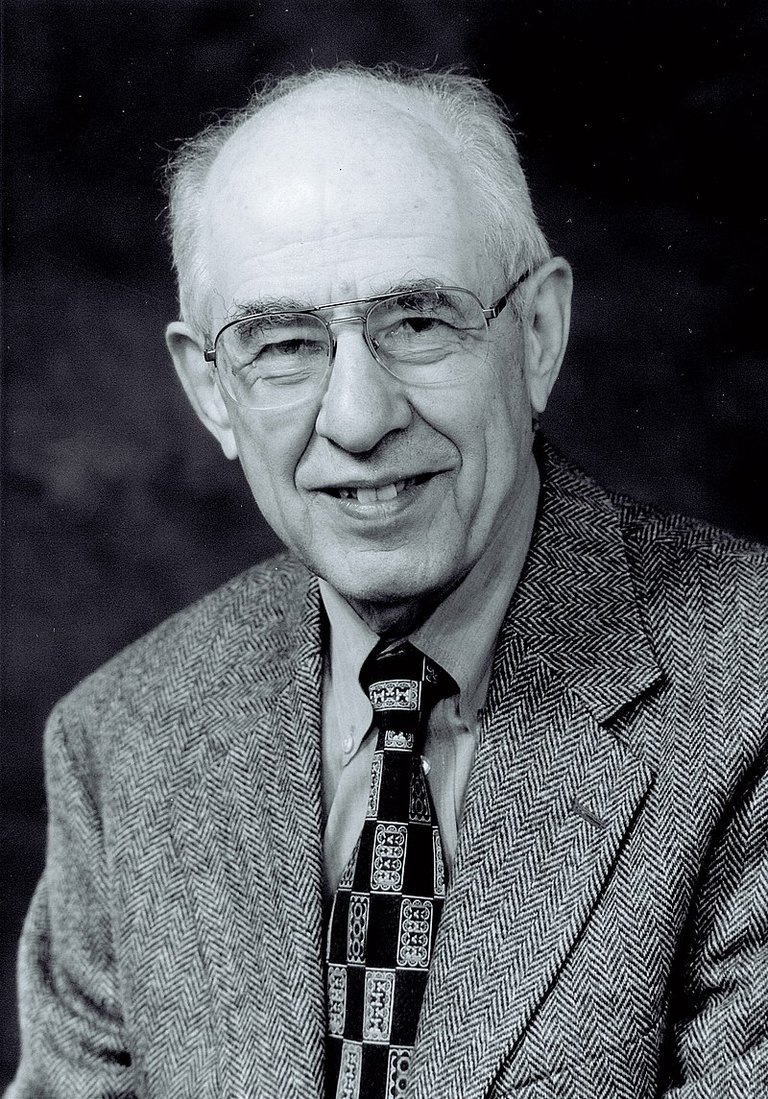
Robert D. Putnam
Got security concerns? According to Rietdijk and Putnam the security of your crypto-wallet is hard coded into several different blockchains of the universe. And it goes like:
Roger Penrose advanced a form of argument that has been called the Andromeda paradox in which he points out that two people walking past each other in the street could have very different present moments.
If one of the people were walking towards the Andromeda Galaxy, then events in this galaxy might be hours or even days advanced of the events on Andromeda for the person walking in the other direction. If this occurs, it would have dramatic effects on our understanding of time. Penrose highlighted the consequences by discussing a potential invasion of Earth by aliens living in the Andromeda Galaxy. As Penrose put it:
Two people pass each other on the street; and according to one of the two people, an Andromedean space fleet has already set off on its journey, while to the other, the decision as to whether or not the journey will actually take place has not yet been made. How can there still be some uncertainty as to the outcome of that decision?
If to either person the decision has already been made, then surely there cannot be any uncertainty. The launching of the space fleet is an inevitability. In fact neither of the people can yet know of the launching of the space fleet. They can know only later, when telescopic observations from earth reveal that the fleet is indeed on its way. Then they can hark back to that chance encounter, and come to the concmlusion that at that time, according to one of them, the decision lay in the uncertain future, while to the other, it lay in the certain past. Was there then any uncertainty about that future? Or was the future of both people already "fixed"?
— Roger Penrose, The Emperor's New Mind: Concerning Computers, Minds, and the Laws of Physics
From the epic "Scientification of Culture":
- Neo-positivism as a special “ideological device” unconsciously attuned to preventing current physical theories and the RU (Relativism-Uncertainty) paradigm from appearing to be wrong
Neo-positivism holds that experimental results and formulas predicting them are the primary elements of physics, rather than understandable models and explaining insights. Such approach has an important de facto, and probably also an unconsciously intended, purport. For, if coherent explanations leading to understandable models are no longer deemed vitally relevant, one actually removes the possibility of being confronted with paradoxes. If some phenomena don’t tally, one simply reacts with: “So what, we need no coherent picture”. Neo-positivists no longer need explanations that keep phenomena coherent. Paradoxes, then, are swept under the carpet.
From the neo-positivistic point of view that now dominates theoretical physics the Michelson-Morley experiment and the Ultraviolet catastrophe would not have conduced to any revision of our basic conceptions about space-time relations and the amounts in which energy is transmitted, respectively. One would have reacted with: “So what, we need no coherent model of reality”. In the present situation we see a very similar situation with various serious paradoxes; that is, phenomena that cannot be integrated into a coherent model. Think of nonlocality as in the paradox of Einstein, Podolsky and Rosen (EPR), the “collapse” of wave packets, wave-particle “duality”, and phenomena “that have no causes” and are defined merely “probabilistically”. Mainstream physics (neo-positivism) reacts with: “No problem; we don’t need coherent models!”. On the contrary, my own approach is
(1) Real paradoxes appear; they should be solved by our abandoning prejudices and/or revising some starting points.
(2) This can precisely be done by our generally abandoning the RU paradigm and in particular our realizing the realistically four-dimensional nature of the universe, the subjects of four-dimensional natural laws being events rather than objects.
(3) As explained in Four-dimensional Reality and its Coherence and in its References, this causes nonlocality, wave-particle “dualism”, the collapse of wave packets and “probabilism” to fit jointly in an understandable, deterministic and coherent physical model.
Neo-positivism is little interested in paradoxes; it acquiesces in them and in an incoherent world rather than considering them as indications that we should revise some primary ideas (prejudices). For example, it is not interested in how two mutually distant EPR particles influence each other, often contortedly arguing that there is no “influence” at all.
Wittgenstein follows suit even beyond microphysics: “All explanation must go, and description should take its place”.
All of this amounts to ignoring the very essence of scientific thinking: coherent explanation and the Aha-Erlebnis.
As far as I can see, the most plausible – simplest and most coherent – explanation of the popularity of neo-positivism, and of abandoning the idea of understandable models, joins with the foregoing. Specifically, it is an unconscious realization that such models, requiring the solution of current paradoxes – i.e., the removal of the paradoxical consequences of mainstream ways of thinking – would imply our not merely abandoning various prejudices about three-dimensional physics but also the RU paradigm and its “troubled waters” more generally.

That is, free will, chance, subjectivism, and the idea that the world is fundamentally “fuzzy” and undetermined. Inter alia, we should understand that our “free will” is a mere epiphenomenon of natural laws in action. (Compare Spinoza: “If a stone could think, it would strive after falling to the earth”, and Schopenhauer: “We are free to do what we want, but not free to want what we want”.) In all, a deterministic four-dimensional so-called “block universe” would fly in the face of many present sacred cows. The future, man’s destiny and the outcome of whatever processes and developments would be subject to natural laws rather than “subject to us” in the way now being associated with free will and an undefined future.
Not only causes but also effects or results would obey laws and be far less a coincidence than according to both the quantum-mechanical and the classical picture. Current mainstream thinking prefers considering the world to often not allowing coherent models, because the alternative is abandoning the “fuzzy”, troubled-waters-friendly RU paradigm. Hence: close your eyes for everything except measurements and formulas predicting their outcomes, and sweep potential paradoxes under the carpet. Lack of coherence is no longer recognized as a shortcoming.
Quite to the contrary, the CT paradigm starts from a model of the world in which natural laws refer to events and the four-dimensional patterns they constitute, rather than mere objects and the forces they exert on each other. Just as with causal laws, such four-dimensional ones can be expected to work by logical, mathematical and/or other coherent principles, among which may be moral or aesthetic ones too. It may be that the dimension of intelligent, nonlocal composition or design of event-patterns is inherent in such four-dimensional laws. This faculty may prominently appear in the “creative” human brain.

1. A characterization of the currently dominating paradigm
Let’s look for a number of cultural and socio-philosophical starting points, such as implicit assumptions and inclinations in various domains of thought, and reach for a possible concise greatest common denominator that amounts to a modern paradigm. First, some history about paradigms.
In his The Structure of Scientific Revolutions (Chicago, 1962) Thomas Kuhn advanced the idea that in all historical periods there is a (highly coherent) set of rather implicit starting points of thinking and action: a paradigm. It will be shared by almost everyone. For example, up to the Enlightenment the paradigm was that God was the Source of everything, and that the social order and its hierarchies were consequences of His will.
From the Renaissance on, and culminating in the Enlightenment, such theological paradigm got gradually undermined by what one may call “naïve rationalism”. This also amounted to the idea that everything in the world is defined by local causality such as demonstrated in the collision of billiard balls. It reached a climax in nineteenth-century physics.
Two developments in particular rather radically revised it in turn.
First, Romanticism, from about 1800 AD on, was a contrasting tendency. It emphasized emotions, the subjective and the intangible. Second, the revolution in physics of the first quarter of the 20th century put in doubt various “rationalistic” concepts such as strict causality, determinism and even the detailedly articulate objective nature of reality. Inter alia, in some microphysical experiments the outcome appeared to co-depend on how the observer prepared his instruments. More precisely, the new physics and Romanticism tended to substitute naïve rationalism by ideas as described under a) and b), respectively:
a) Positivism, maintaining that only observations (experiments) and formulas predicting their outcomes and coordinating them are relevant in science. Neither understandable models of “reality” nor even coherent explanations matter (much). Also, values should play no part in science and should be strictly separated from facts; they cannot be derived from the latter. Most micro-physicists think positivistically and hold that “detailed models of ‘reality’ only lead to paradoxes, and are also superfluous”. They feel much in the world to be fundamentally uncertain and “fuzzy”.
b) Current “sceptical” romanticism succeeded the more idealistic variant of the 19th century. It contrasts with rationalism by emphasizing the subjective, impressions, the spontaneous and the incidental (also as to emotions), and, further, because of its relativism.
These two modern attitudes have in common a rejection of more-than-local coherence: determinism, coherent models, any objective meaning of man’s life, society or the universe, and the idea of progress. Much in the world is subjectivized, relativized or “fuzzied”. Uncertainty, unmakability, and scepticism about “the truth” are correlates. Man-centeredness appears in two ways: positivistic emphasis on observations as opposed to coherent models, and in romanticism’s preponderant interest in subjective experience and freedom.
We can conclude that modern thinking is highly governed by a paradigm that succeeded naïve rationalism, and which is typified by the thesis: “Fundamental uncertainty, ‘fuzziness’ and the elusiveness of understandable models in microphysics, and relativity and subjectivity of values and of the idea of progress, make incoherence and chance basic features of life and the world”. We call it the Relativism-Uncertainty paradigm or RU.

It is closely associated with some more practical attitudes and phenomena:
The here and now get more weight; think of consumer mentality and short-term hedonism.
Modern incoherent art and subjectivistic, man-centered philosophy and literature (abstract paintings, incomprehensible poems, the “poly-interpretable”, existentialism, postmodernism,…).
Emphasizing freedom so much that duties and responsibility get less attention.
“Nurture” is more important than “nature” and every individual is fundamentally (genetically and morally) of the same value because quality is relativized and not in the genes.
Such egalitarianism is part and parcel of current solidarity ideology and political correctness that succeeded religion and nationalism.
In connection with point 5. realize that all solidarity ideologies have one important shared feature: our “rallying round what we have in common” (which will often be “the centre”, such as the government). Within this scope, nationalism has been called “an instrument to make the many exert themselves for the benefit of the few (that is, the establishment)”.
Note that solidarity ideologies imply our not (or less) criticising (important) social actors, that is, sectors of the establishment, which should be basically accepted as they are. Political correctness even extends such acceptance to problem groups and what others may feel to be moral and/or genetic rearguards. Solidarity ideologies actually imply that we should neither be whistle-blowers as to society as a whole. Here we see an aspect of current paradigm that will support the status quo: relativism => egalitarianism => solidarity => not being a whistle-blower on the highest level. Note, more fundamentally, that relativism already in the first place devalues any possible moral criticism of de facto power or situations! It has some relation with conformism: accept others, or situations, as they are.
In all, many have an interest in truth, good and evil to be like rubber rather than diamond.
Source:
Cornelis Willem (Wim) Rietdijk:
https://bcb.home.xs4all.nl/rietdijk.html
https://nl.wikipedia.org/wiki/Wim_Rietdijk
Hi! I am a robot. I just upvoted you! I found similar content that readers might be interested in:
https://bcb.home.xs4all.nl/rietdijk36.html
Congratulations @madhill! You have completed some achievement on Steemit and have been rewarded with new badge(s) :
Click on any badge to view your own Board of Honor on SteemitBoard.
To support your work, I also upvoted your post!
For more information about SteemitBoard, click here
If you no longer want to receive notifications, reply to this comment with the word
STOPDo not miss the last announcement from @steemitboard!